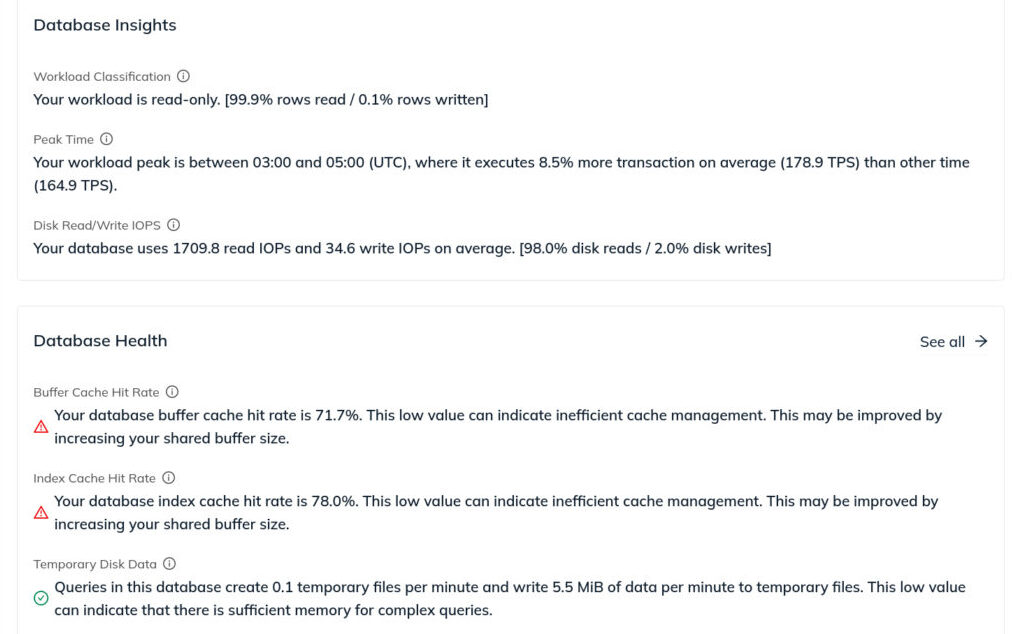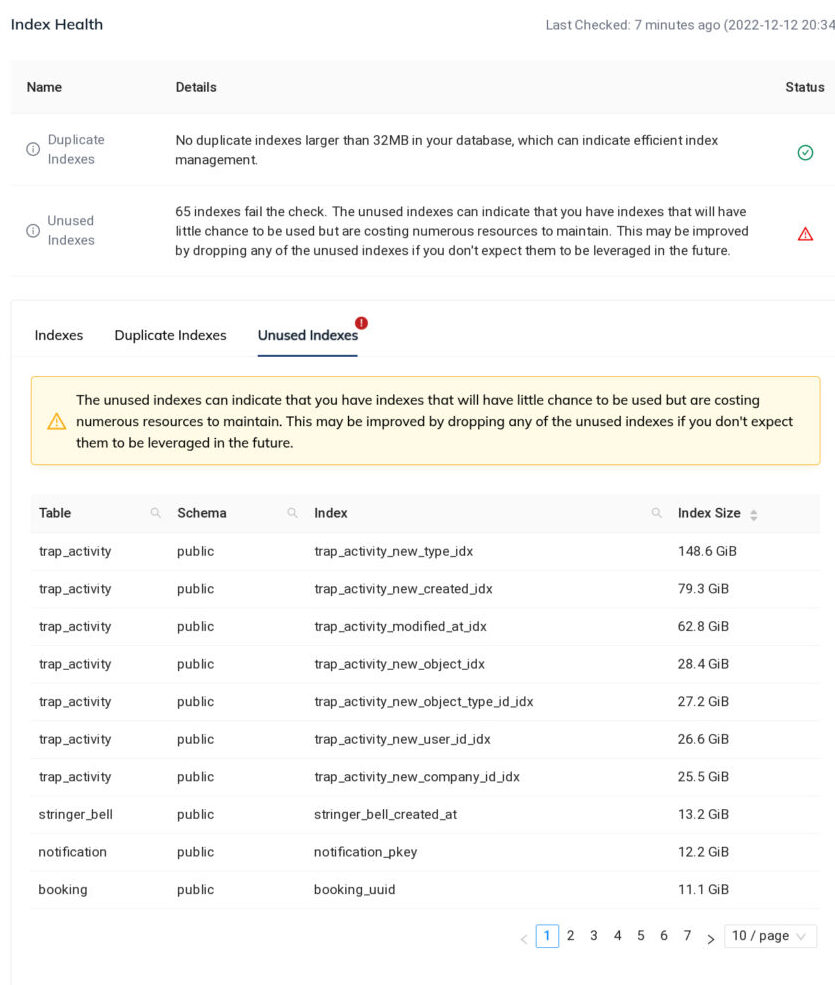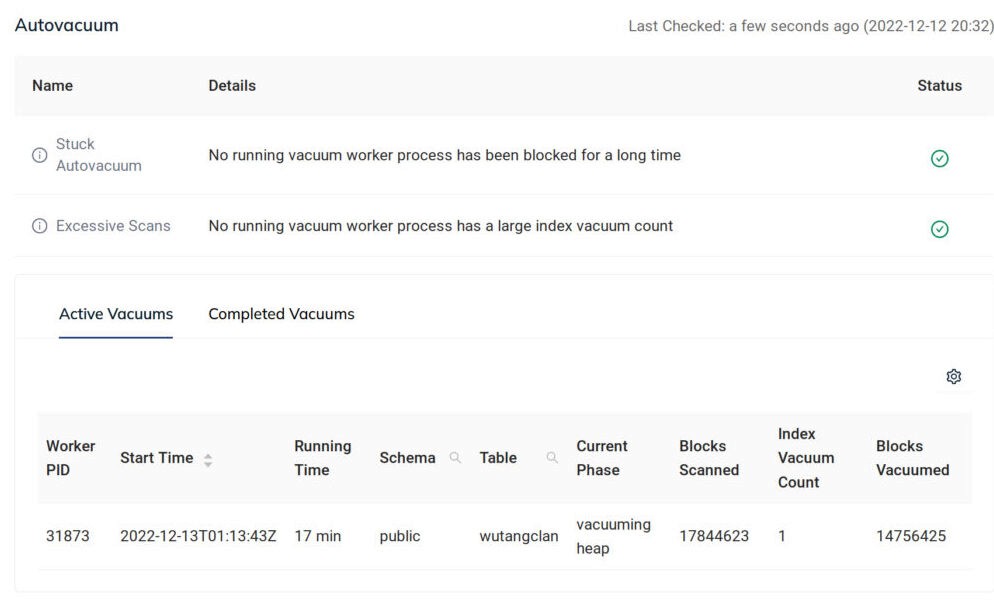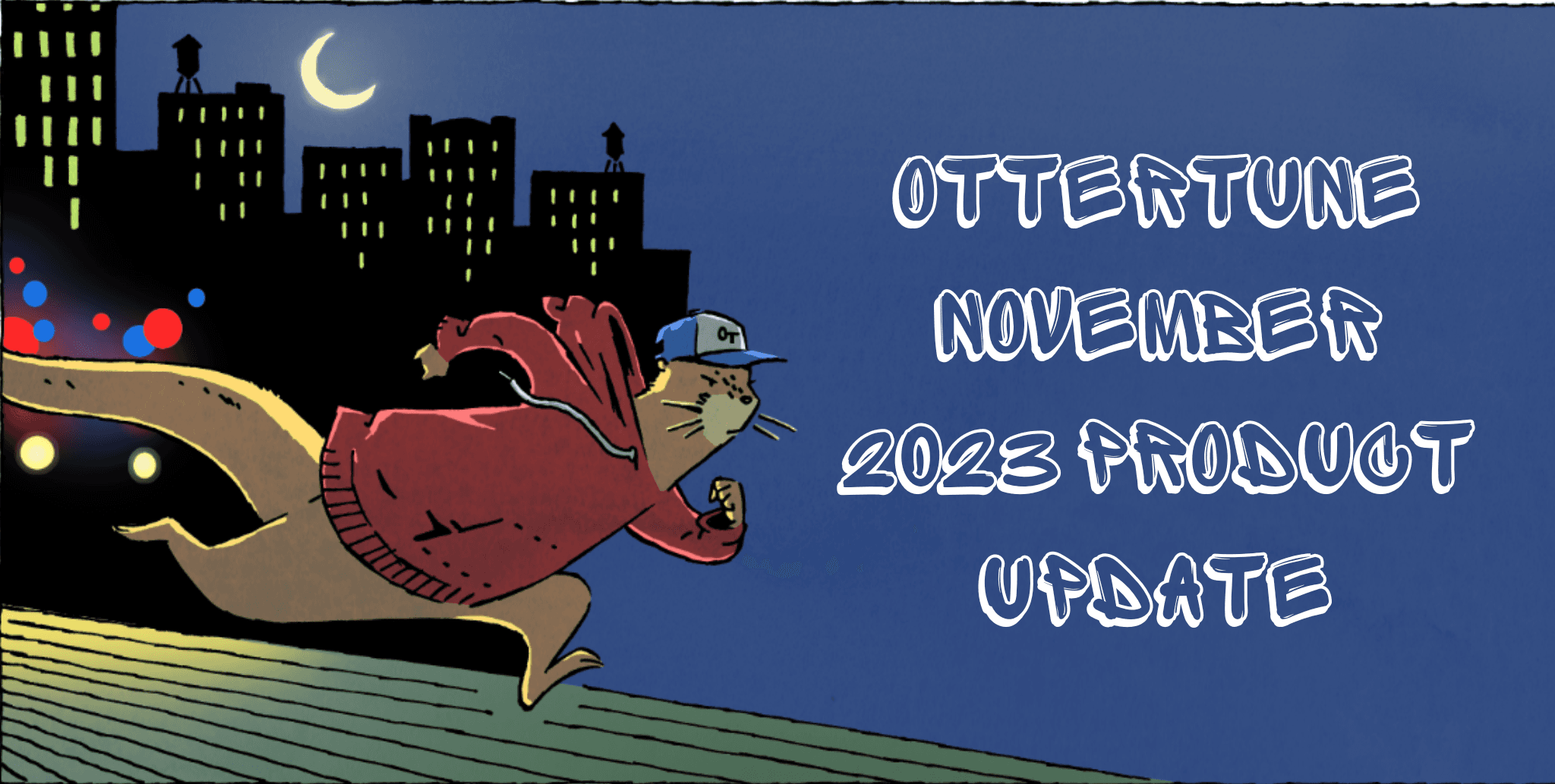Dec 14, 2022
OtterTune v1.5
OtterTune Team
Open-source databases are blowing up. (Trust us – this is a good thing.) And OtterTune is keeping up.
Our new software release, OtterTune v1.5 (press release here), includes all the good things we were able to implement in 2022, including: human in the loop capability for user approval of configuration changes; health checks for indexes, configuration, database tables, and autovacuum; and new performance insights.
OtterTune is available through the AWS Marketplace, where users can pay for the service with AWS credits, as well as the OtterTune website.
Our Database Insights + Health Checks Overview feature gives you a view of your database instance’s status at a glance.

And OtterTune is now much easier to install. OtterTune v1.5 is integrated with the Okta single sign-on platform; with CloudFormation and Terraform for installation; and both email and Slack for alerts. OtterTune is now SOC 2 compliant.
As our friends know, and our rivals fear, OtterTune makes and recommends changes iteratively; results often improve steadily as OtterTune tracks changes in database updates and queries. The service is available for MySQL and PostgreSQL on Amazon RDS and, more recently, Amazon Aurora and Amazon Aurora Serverless.
Users can connect an initial database instance for free; enhanced tuning options and additional instances can be connected for $110 per month per instance directly from the website, or under contract for more flexible terms. (Buy now; that number may not be so low in the New Year. We’re just sayin’.)
OtterTune uses a local agent (which is not a secret agent – it’s open source software) to gather database and query metadata. OtterTune uses this data to recommend, or directly make changes to a database instance’s configuration, indexes, and queries. For both PostgreSQL and MySQL, OtterTune now helps users tune for P99 query latency.
These dank beats, and more, add to the original OtterTune feature set: the use of machine learning to improve your configuration settings (“knobs”); version tracking for configurations; tuning schedules; and tight integration with PostgreSQL and MySQL for Amazon RDS.
What we’ve learned since launch
Since our launch in May of this year, our customers have taught us about life out there in database land. They mostly don’t put cost first; performance is #1 with most of these hard cases. Of course, it’s a trade-off – more expensive hardware should get you better performance – but we see fast query response as being vitally important to our crew.
At the same time, the snakes on this particular plane are rising cloud costs. Cloud providers are getting hit with inflation, especially higher energy costs, especially in the UK and Europe. So we will be seeing price increases in 2023, just as companies want to tighten their belts in the face of possible hard times.
Customers also want to know that their database instances are operating well and at peak efficiency all the time. Once they get the 411, they will take action where needed. And finally, OtterTune users want easy installation.
OtterTune v1.5 meets all these requirements. For instance, there’s a smooth onboarding experience and the ability to tune for P99 query latency, and even more improvements on the drawing board. Future releases of OtterTune will be more interactive and will help to optimize a broader range of database functionality.
And we find that customers want more ways to engage with OtterTune:
Do-it-yourself purchase and installation, our initial focus, remains popular.
Users with several OtterTuned instances often prefer to move to contract – and some prefer to start that way.
The AWS Marketplace is an important addition to our payment availability options.
OtterTune basics
When it comes to configuration, both PostgreSQL and MySQL are playing the dozens – dozens of configuration options, known as knobs, which control the operation of each database. Knob values can greatly improve or hinder database operation.
The automatic changes and user recommendations that OtterTune delivers can achieve price/performance improvements of up to 2x compared to unoptimized databases. When users try to hand-tune knobs themselves, they take a lot of time, have to consult contradictory sources, and can even do more harm than good. Users who have OtterTune know that their database optimization is in good hands.
This screenshot shows the Unused Instances Health Check, which helps you find – you guessed it – instances that get no traffic.

All that’s new in v1.5
Since OtterTune’s launch in May 2021, we have added product features in eight areas. As of OtterTune v1.5, available today, major feature improvements include:
Improved installation. The setup process is much easier now. OtterTune can use CloudFormation and Terraform templates for installation and/or provisioning; Okta for self-service registration; and Kubernetes manifests for deploying the OtterTune agent.
Integrations. OtterTune works with Slack for alerting when our algorithms generate a new configuration for your database.
Now with more database services. OtterTune has added Amazon Aurora and Amazon Aurora Serverless support in addition to stock Amazon RDS for PostgreSQL and MySQL.
Supported database versions. Added support for PostgreSQL 14.
Agent. The OtterTune Agent now collects anonymized query statistics, query digests, and some anonymized schema info.
Tuning objectives. Tuning can now address 99th percentile (p99) query latency as well as CPU utilization.
Tuning management. OtterTune now includes customizable tuning schedules for when automatic optimizations are made; configuration versioning under end user control; human-in-the-loop user approval of knob changes; rating of different OtterTune configurations vs. the (original) baseline price/performance; and the ability to manage the user’s OtterTune subscription from the Account Settings page in the software.
Health checks. OtterTune has added a wide range of database health checks, including performance and workload insights; memory utilization and resource under-utilization checks; table-level statistics; index statistics and health; vacuum health for PostgreSQL on RDS and Aurora; database event analysis; and improvements to troubleshooting and error handling.
This screenshot shows OtterTune’s autovacuum Health Check, which helps make sure that the database instance is receiving sufficient vacuuming attention to keep performance high – without running the vacuum so often that the vacuuming process itself causes an undue hit on performance.

Data security and privacy
Security and privacy are a key concern for OtterTune. OtterTune uses an open source agent to gather metadata about databases and queries, with query specifics anonymized; no database or query content is included in the information that OtterTune gathers.
To assure themselves about what OtterTune gathers and doesn’t gather, and how OtterTune uses the information, customers can:
Inspect the agent source code.
Modify (if needed), compile, and run the agent themselves.
Monitor traffic between the agent and OtterTune.
Reach out to OtterTune to create a custom plan that specifies and limits what information the OtterTune agent is allowed to gather (verifiable by inspecting the agent source code).
Future releases of OtterTune are expected to offer specific security improvements for databases running the service.
How to learn more
For full information about OtterTune, see our full documentation. And our homepage gives a overview of the product.
To try OtterTune for yourself, visit our Pricing page.
We are also gathering user requirements for a brand new OtterTune coming in early 2023! The next version of OtterTune is going to go beyond just optimizing your database for performance or cost. It is going to provide you with 24/7 automation of your database so that you can sleep better at night knowing that OtterTune’s advanced AI algorithms are watching your database at all times.
This release will help optimize an even wider range of database functionality and will further increase interactivity with OtterTune’s capabilities. So if you have questions about our product, or feature requests, please contact OtterTune.




